One-minute review
Netac is a well-known purveyor of flash drives and portable SSDs, and the US5 falls into a curious space where it tries to do both of these things simultaneously.
Sporting both USB-A and USB-C blades, the gum-stick-sized US5 is designed to be easy to carry and fast enough for regular data transport.
Depending on the model, the capacity ranges from 128GB up to 1TB, and depending on what formats you apply to the storage, it can work with any modern version of Windows, Mac OS or Linux.
Netac describes the casing as a ‘sleek sports car design’, code for two cover elements that fold to cover each blade independently. These provide a good amount of protection for the drive, though the alloy castings that these are made do increase the weight of the US5 to around 50g.
Probably the biggest selling point of this drive is that it performs like a SATA SSD, with Read/Write speeds in the 550/500MB/s ballpark.
That’s better than most flash drives in this form factor but short of the 1,000MB/s that a dedicated external SDD might achieve for almost the same money.
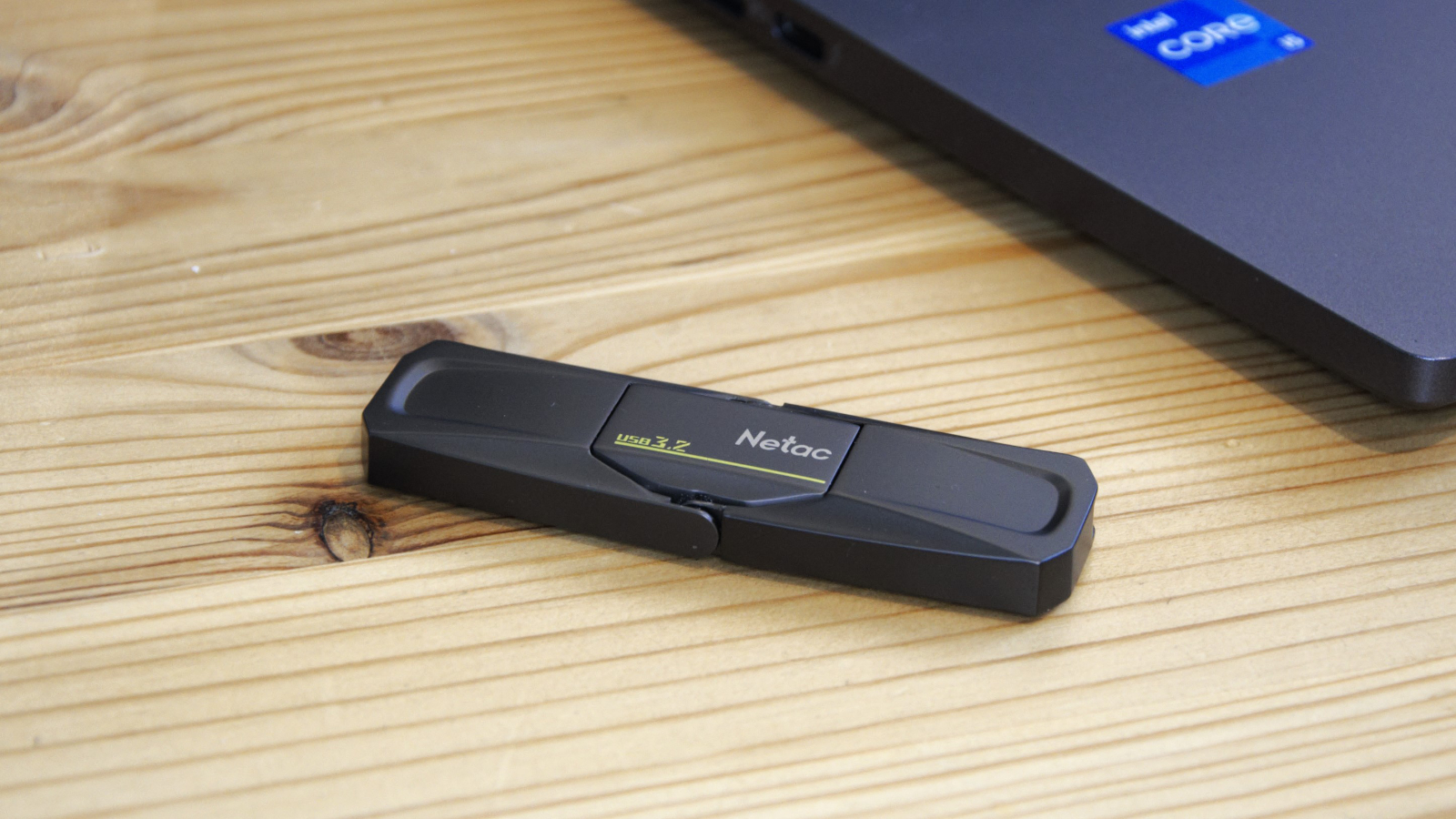
Netac US5 Portable SSD: Pricing and availability
- How much does it cost? From $28.99/£26 for a 128GB model
- When is it out? Now
- Where can you get it? Amazon and other mainstream online retailers
The cost of the US5 is relatively low, although, with so many brands in this sector, I’m sure it is possible to find cheaper drives of a similar or better spec.
In the USA, through Amazon.com, the US5 costs $28.99, $36.99, $44.99 and $72.99 for the 128GB, 256GB, 512GB and 1TB options. UK costs are £25.99, £33.99 and £49.99 for the first three capacities, with the 1TB model reviewed here currently out of stock.
Given the modest price differences, why anyone would buy the two smaller drives is a mystery.
The problem the Netac US5 has is that the Crucial X9 costs only two dollars more for the 1TB capacity, can muster twice the speed and has better durability credentials. We know which we would have, given the choice.
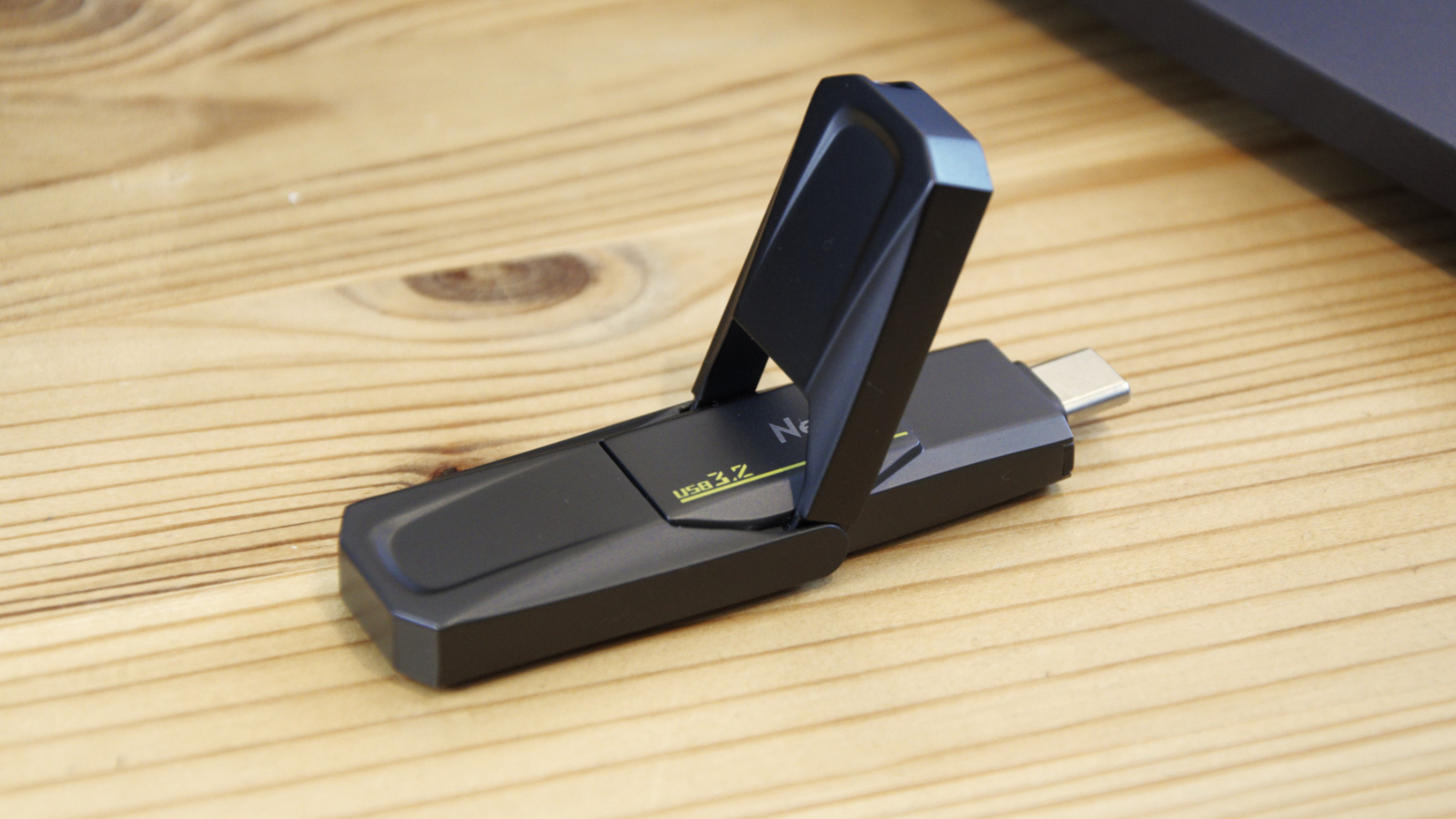
Netac US5 Portable SSD: Specs
| Model Tested | NT03US5C-001T-32TA |
| Capacities | 128GB/250GB/500GB/1TB |
| Capacity tested | 1TB |
| Tested sequential performance (Read/Write) | 521/400 MB/s |
| Connection | USB 3.2 Gen 2 using Type-C or Type-A |
| Encryption | Hardware |
| Dimensions | 78 x 23 x 9.65mm (WxHxD) |
| Weight | 50g |
| Warranty | 5 years limited |
Netac US5 Portable SSD: Design
- Metal case
- Swing covers
- Durable-ish
USB flash drives that offer both USB-C and USB-A blades tend to use a sliding sheath design so that only one is exposed at any time. Oddly, with the US5, you can expose both at the same time. For the curious among you, trying to plug it into two devices simultaneously will probably cause the drive to die, an electrical fire, and the demise of the two devices at either end.
Each end has a cast metal cover that pivots up from a central shared axel. If, like us, your curiosity gets the better of you, and you pivot both sides, then one of the covers will fall off. It can be forced back on, but we’d avoid the temptation to experiment in the first place.
Magnets hold the blade cover in place, thankfully stopping them from swinging up when the drive is pocketed.
However, one of the covers has a stunning design flaw, and it’s the one that covers the USB-A blade. Using that blade requires the cover to come to at least 45 degrees, which is easy if the port that it is being inserted is on a desktop computer with plenty of space around the port. But on a Mini PC or laptop, the possibility exists that the port is inverted. In that scenario, it is impossible to insert the drive without putting something under the device to elevate it and give sufficient clearance. How this issue wasn’t noticed in product development is a question only Netac can answer.
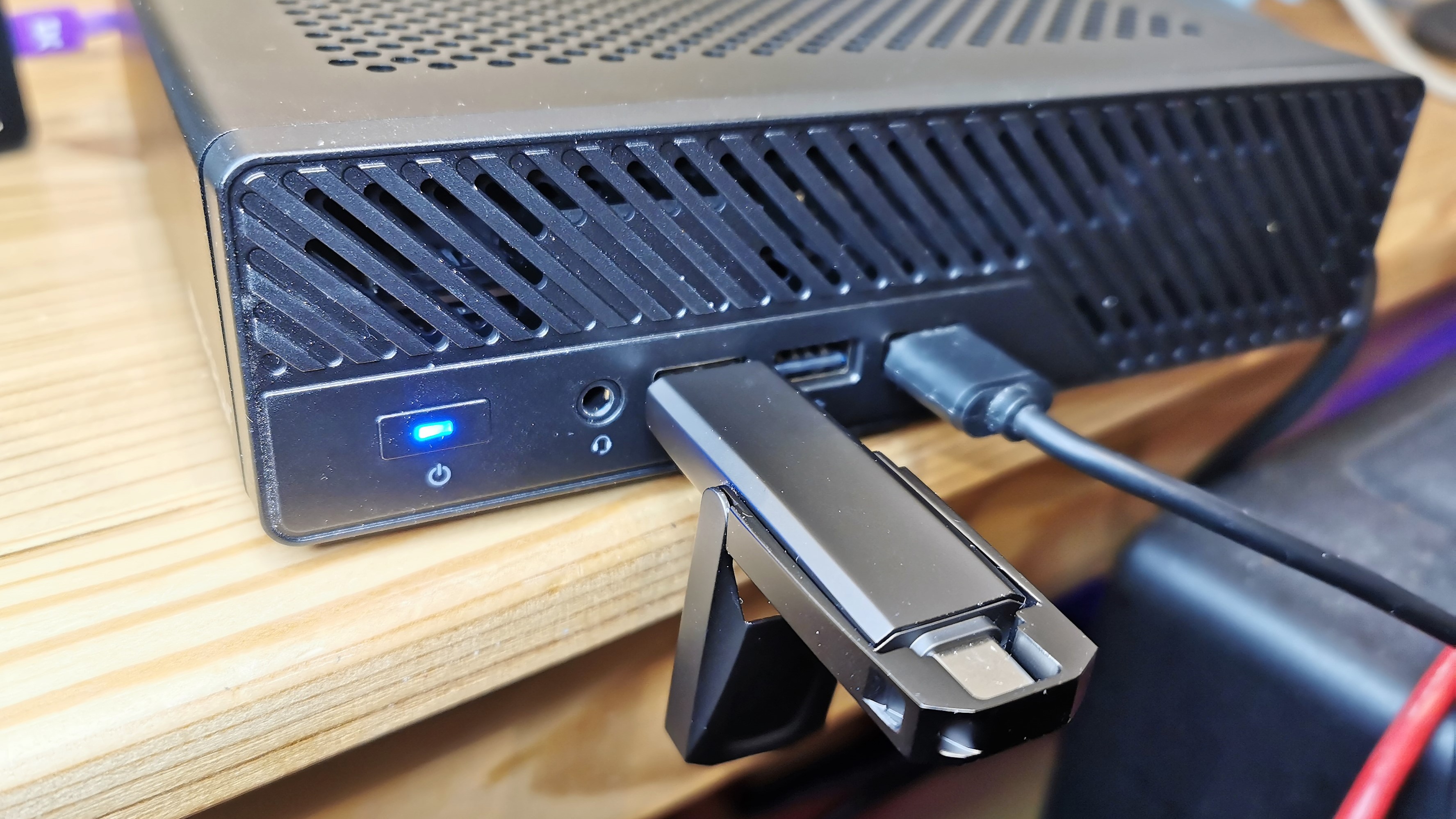
Another lack of forethought is that the drive has no capacity printed on the outside of the US5. If you have a 500GB and a 1TB model, then other than plugging them in, there is no easy way to determine which is which.
Netac talks about durability and shockproofing, but they do not quote any standards or tests that the US5 was subjected to. It feels chunky and able to handle some abuse, but exactly how much isn’t stated.
Netac US5 Portable SSD: Software
The US5 contains no software, and none is offered on the Netac website.
Considering that almost every other drive maker has a sync tool or something similar, this is rather disappointing.
Netac US5 Portable SSD: Performance
- Modest performer
- Better on USB-C than USB-A
- Hardware encryption
| Bench | USB-C Read MB/s | USB-C Write MB/s | USB-A Read MB/s | USB-A Write MB/s |
|---|---|---|---|---|
| AJA System | 497 | 322 | 421 | 288 |
| ATTO | 537 | 498 | 432 | 419 |
| AS SSD | 493 | 458 | 412 | 390 |
| CrystalDiskM. | 521 | 400 | 450 | 435 |
When testing this drive, the quoted performance levels rarely materialised.
We were curious if the two interface options, USB-C and USB-A, operated at the same potential speeds. The answer appears to be that they don’t.
We suspect that the USB-C end of the device runs in Gen 2 mode and the USB-A in Gen 1. Because depending on the test, the USB-C end can be up to 20% faster than the USB-A connection. It’s helpful to know if you have the option of either port.
While this drive is reasonably fast compared to a cheap USB 3.0 (Gen 1) drive, it doesn’t deliver the performance levels seen by external SSDs, like the Crucial X9 Pro or Kingston XS1000.
On the plus side of the US5 equation, this drive is compatible with Win To Go technology and supports hardware encryption. That last feature is helpful should you use BitLocker or similar tools to secure drives’ contents before transporting them.
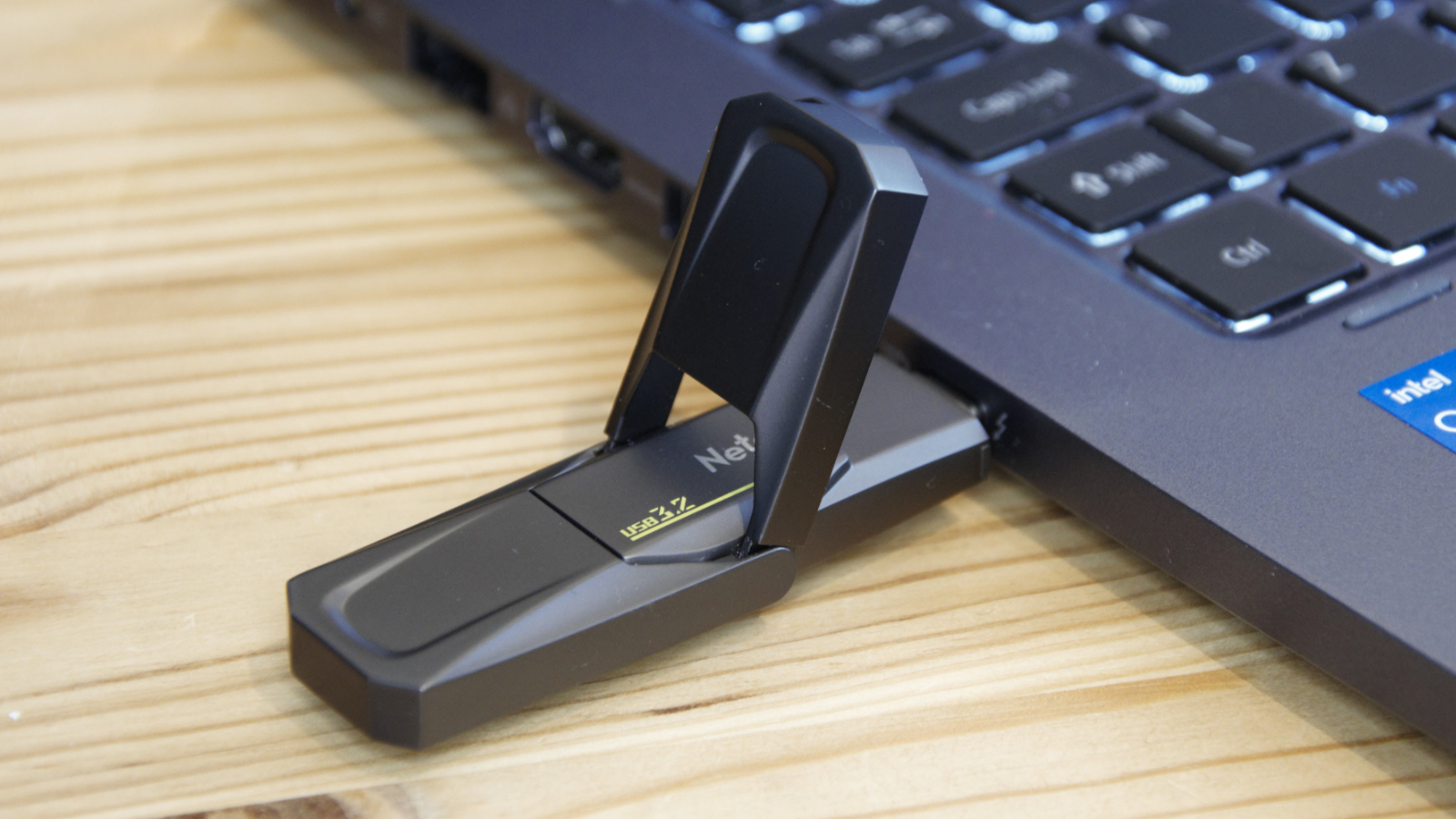
Netac US5 Portable SSD: Verdict
The concept behind this product is a good one. Specifically, take a SATA-rated flash module and provide it with a fast enough USB controller to be connectable to any PC and deliver better than 500MB/s transfers.
But the US5 started going wrong even before performance testing because its designers assumed that all USB ports are always the same way up. A silly mistake that makes the drive much less useful for those with inverted USB-A ports.
Passing over how the port covers fall off if you push them in the wrong direction, the lack of capacity markings. The design mistakes and the omission of software tools strongly hint that this product was rushed to market with undue haste.
Should I buy the Netac US5 Portable SSD
| Value | For the capacities, the prices are competitive. | 3 / 5 |
| Design | Blade covers fall off and doesn’t work with inverted ports. | 3 / 5 |
| Software | Missing in action | 0 / 5 |
| Performance | SATA drive performance levels | 3/ 5 |
| Overall | Some silly design flaws and a lack of software undermine what could have been a decent product. | 3 / 5 |
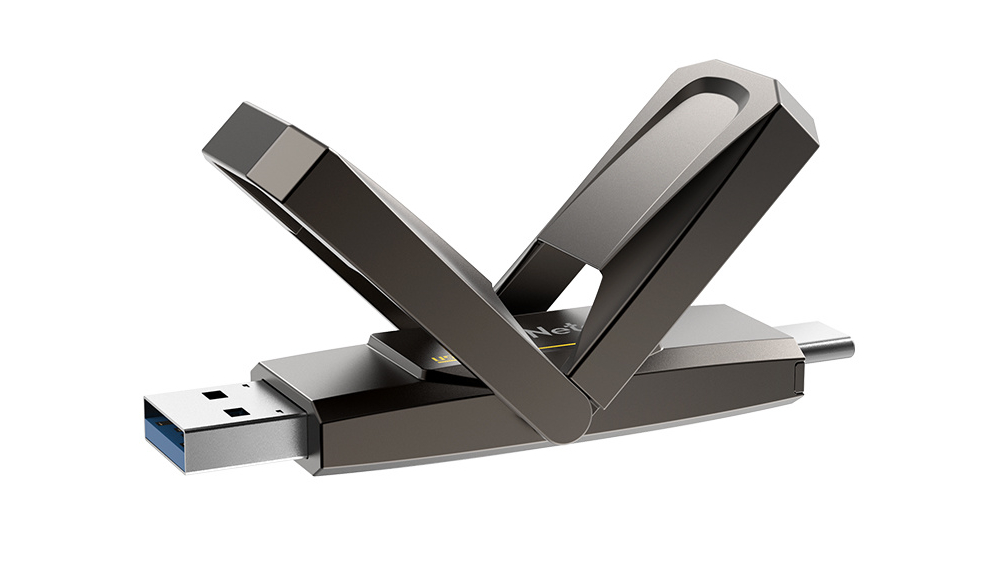
Buy it if…
Don’t buy it if…
Also consider
We’ve covered all the best external SSDs here for you













